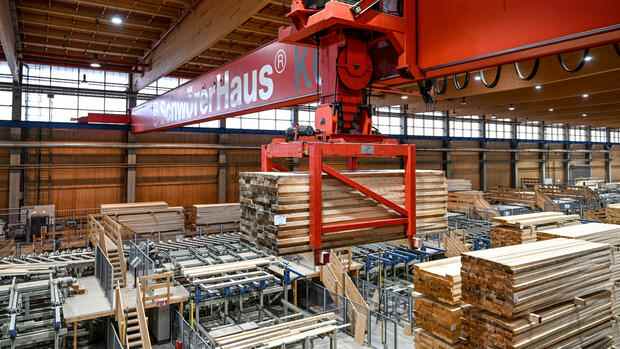Experts had expected a smaller increase in production.
(Photo: dpa)
Berlin German companies, stricken by inflation and material shortages, surprisingly ramped up their production in September. Industry, construction and energy suppliers together produced 0.6 percent more than in the previous month, as the Federal Statistical Office announced on Monday.
Economists polled by Reuters had expected a plus of just 0.2 percent after output was cut by a revised 1.2 percent in August. “But the recent slump in incoming orders and the Ifo business climate, which has been falling for months, continue to point to a recession in the winter half-year,” explained Commerzbank chief economist Jörg Krämer. “However, this should not be as deep as in the Corona crisis, as long as well-stocked gas storage facilities and high gas deliveries make gas rationing unlikely.”
Compared to September 2021, production was now 2.6 percent higher. In the entire summer there was an increase of 0.5 percent compared to the previous quarter. “Nevertheless, the outlook for the coming months remains clouded,” said the Federal Ministry of Economics. The mood in the companies is still “significantly cool and demand is noticeably declining”.
While industry increased its production by 0.7 percent in September, the energy sector – after a sharp drop in August – grew by 1.7 percent. However, production in the energy-intensive sectors fell by 0.9 percent compared to the previous month and by 9.7 percent compared to the previous year. “Measured against the general conditions, that was not a bad number at all,” said Jens-Oliver Niklasch from LBBW, but added.
Top jobs of the day
Find the best jobs now and
be notified by email.
“The massive decline in the energy-intensive sectors is likely to further fuel the discussion about the threat of de-industrialization.” The hope now lies in the energy price brake, added chief economist Thomas Gitzel from VP Bank. “If industrial companies benefit from lower electricity and gas prices, this could have a positive effect on production development in the coming year.”
Production increase in September is a “glimmer of hope”
The increase in production in September is a “glimmer of hope” and an explanation for the better than expected growth of the entire German economy of 0.3 percent in the third quarter, explained Gitzel. “At the same time, there is hope that the supply chains, which are functioning better again, will also bear fruit in the final quarter.” If this were the case, private consumption, which was falling due to high inflation, could at least be offset somewhat.
Recently, the bad news from the economy had piled up, which according to the head of the Bundesbank, Joachim Nagel, is likely to face a technical recession – that is, two quarters of shrinking gross domestic product in a row. Incoming orders fell by 4.0 percent in September.
And the high energy prices and the global economic slowdown are also affecting exporters: exports shrank by 0.5 percent in September. The economic barometer from stockbrokers for Germany, the Sentix index, rose by 7.4 points to minus 30 points in November. “All in all, however, no trend reversal,” summed up Managing Director Manfred Hübner from the investment consulting firm Sentix.
More: Consumer sentiment is still in the doldrums – but things are looking up
